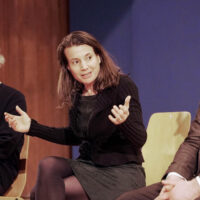Anthroposophic Medicine has for years continued to develop internationally in its structures and ideas. In doing so, the Medical Section has always expanded its view to include global development. An expression of this is the annual conference of the medical movement in Dornach, which across occupations attracts people from all therapeutic professions and from all continents and countries.
Among many initiatives and activities, Anthromedics and CARE are exemplary projects of the Section in terms of international effectiveness. Anthromedics is a portal for Anthroposophic Medicine founded by Matthias Girke which, in addition to an introduction to the principles and practice of Anthroposophic Medicine, provides access in its digital archive to over 7000 articles from the specialist journal Der Merkurstab (The Staff of Mercury) and its predecessors since 1946. Anthromedics is linked to the bibliographic internet database CrossRef so that the automatic linking of literature sources with other scientific platforms is ensured. One focus of this portal is the freely accessible practice recommendations, initiated by Matthias Girke and Georg Soldner, for currently five key CARE topics in three languages (German, English, and Spanish). They have been continuously worked on since 2017 by international expert commissions in which all the healthcare professions in Anthroposophic Medicine work together. These include pregnancy, birth, and early childhood (CARE I), dealing with fever and infectious diseases (CARE II), psychosomatic disorders with special emphasis on sleep and anxiety disorders, depression and post-traumatic stress disorder (CARE III), oncology (CARE IV), and palliative medicine, pain management and support for the dying patient (CARE V).
In All Parts of the World
The International Postgraduate Medical Training (IPMT) founded by Michaela Glöckler remains an instrument for representing, developing, and expanding Anthroposophic Medicine in all parts of the world to the present day. In this format alone, 37 five-year courses for further training in Anthroposophic Medicine have been completed in 27 countries over the last 20 years, and a total of 241 one-week courses, some of them online at the time of the pandemic, have been held on all continents – from Asia to Eastern Europe, from South America to Africa, from North America to Russia. The interdisciplinary and interprofessional character of the IPMT contributed and continues to contribute actively to the cooperative concept of Anthroposophic Medicine between nurses, therapists, and physicians. Anthroposophic Medicine thus proves to be a highly modern and up-to-date medical concept of integrative medicine.
The so-called Research Council is a platform founded in 1999 by scientists and physicians who are active in research in connection with Anthroposophic Medicine. It has since organized regular, sometimes annual events and meetings. For some years now, a separate scientific conference has been held in Dornach in the spring, this year from 3 to 5 March on the topic One Health – Studying and Addressing Life in Medicine. In this way, a growing network of anthroposophical scientific activities has arisen over the years. In addition, endowed professorships for anthroposophic and integrative medicine have been established at numerous universities. In Germany alone, at the Charité Hospital in Berlin, in Freiburg, in Witten-Herdecke, in Tübingen, and on Ulm and beyond that in Leiden (Netherlands) and in Switzerland in Basel and Bern. Anthroposophic Medicine is also represented at the University of São Paulo (Brazil) and there are contacts with universities as far away as the Philippines. This development is expressed in an increasing number of publications on the basis, or the clinical applications of Anthroposophic Medicine, which are also published internationally.
Last but not least, the extensive knowledge about mistletoe therapy has grown enormously over the years. On the initiative of the Medical Section and under the leadership of Georg Soldner, a complete overview of the mistletoe literature was placed on the Misteltoe Therapie website. This website, too, is now accessible in Spanish and English and achieves a monthly access rate of over 8,000 hits, rising steadily. Another aspect of how Anthroposophic Medicine is perceived internationally and scientifically is through scientific conferences, be it the European Congress for Integrative Medicine (ECIM), the International Congress on Traditional, Complementary, and Integrative Medicine Research (ISCMR), or others – Anthroposophic Medicine is represented through contributions, posters, and publications.

Anthroposophic Medicine Attains Official Status
An important milestone was the International Congress for Integrative Medicine in Stuttgart in 2016 which not only generated a broad discourse and interesting contributions but also received a strategic outlook from the then chair of the American specialist association, the Academy of Integrative Health & Medicine (AIHM), Dr. Mimi Guarneri: integrative medicine is the mainstream medicine of the future. Since then, Anthroposophic Medicine has contributed to the development of integrative medicine conceptually, in terms of content, and scientifically, including at an international level.
At the same time, the head of the Department of Traditional, Complementary, and Integrative Medicine of the World Health Organization (WHO), Dr. Zhang Qi, approached the leadership of the International Federation of Anthroposophic Medical Associations (IVAA) and the Medical Section at this congress. He offered to convert the training standards (framework curricula) of the Medical Section and its professional groups into WHO standards, under appropriate review, in cooperation between the IVAA and the WHO. After seven years, this development has now come to a successful conclusion in spring 2023 with the official publication of the Benchmarks for Training in Anthroposophic Medicine by the WHO department.
All those involved should be thanked with the greatest appreciation for the effort that this process required. It is a milestone for Anthroposophic Medicine. It thus acquires an official status in the countries and continents mentioned, representing a frame of reference for physicians, therapists, nurses, and all healthcare professions in which Anthroposophic Medicine can develop structurally and in terms of content. We would like to take this opportunity to thank the initiators Thomas Breitkreuz, Tido von Schön-Angerer, and Georg Soldner most warmly. Anthroposophic Medicine thus becomes part of a global strategy for a relationship-based, individualized, multidimensional, integrative medical approach.
The curricular recognition of Anthroposophic Medicine as an independent system by the WHO can now form the basis for anchoring Anthroposophic Medicine internationally as a categorial system also in the English-language medical scientific literature in the databases (Medline) and so-called MeSH terms, and thus to make it visible as an independent system of medicine. Let it be an incentive to live up to this claim. All stakeholders are invited to continue to develop its substance in terms of content into the future.
‘One Medicine’ in Responsibility for the Earth
Requirements of this kind are also reflected not least in the concept of One Health that has been developed in recent years. It means expanding healthcare to include the perspective of geomedicine and focusing on responsibility for the earth and humans alike as a therapeutic task for humanity. The Medical Section has recently contributed a lot of content here. In the near future, congresses and conferences will lead to further cooperation partnerships and networking opportunities in which Anthroposophic Medicine can also actively engage in this context.
Special thanks in this connection are due to Matthias Girke and Georg Soldner and their team, who from within the Section leadership have always inspired and supported these strategic steps leading out into the world, despite their extremely demanding and stressful day-to-day work.
Friedemann Schad and Harald Matthes, for the Medical Directorate and Management,
Havelhöhe Community Hospital, Berlin
Translation Christian von Arnim
Images Xue Li





